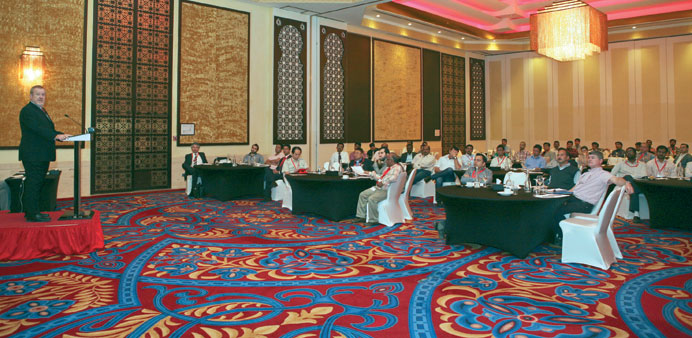By Hamza Jilani/Staff Reporter
A playwright should address the concerns of his audience and a great play is one that is close to the people, something they they can relate to, local theatre legend Ghanem al-Sulaiti has said.
He has taught some 30 aspiring actors and playwrights at Qoul Qousa: Creative Writing Workshop, which was organised by Doha Film Institute (DFI) at Katara - the Cultural Village.
By engaging his students from around the Arab world, al-Sulaiti stressed the importance of creativity and emotional relativity in writing. He said it is important to not only write a story that the author likes at a personal level, but also strive for success by answering to an audience’s interests and emotions. “A play becomes a big hit when it’s something that is close to the people, something that they can relate to and is reflective of the real world, not something that is written by a writer for himself. The story cannot be far from their perceptions, thoughts and emotions. That’s the most important thing. What are they thinking about? What is going on in the world around them? What’s important to them?” he explained.
“I’m from the school of thought that holds the director and producer as servants of the people and their ideas. You can educate through that and reach them. Even make them cry. And this isn’t for Qatar alone, this is true for the whole world.”
While the students were largely Qataris, the workshop also enjoyed the participation of Arab nationals from Syria and Saudi Arabia. “When I heard that this workshop was happening, I decided that I had to attend it. My fellow actors back home could not grab the opportunity due to work constraints. However, work simply wasn’t enough to make me miss out,” said locally-famous Saudi actor Ibrahim Mozair’i, 29, who had been following the DFI and al-Sulaiti on Twitter, where he found out about the programme.
“My friends and colleagues regret not coming, but are nagging me on a daily basis to tell them what I’m learning. I told them that I need time for myself to absorb all that I’m learning and will sit with them when I go back home. Ghanem al-Sulaiti has been one of our biggest role models and I’m thankful to be here. I’m learning from his decades of experience in just five days,” he continued.
Al-Sulaiti said while he was thankful to the DFI for its efforts “to spark change, a renaissance in theatre arts in Qatar and the Arab world, much more needed to be done”.
According to him, while sincere talent is found throughout the Middle East, many obstacles lie in the path to success and stardom for aspiring talents in Arab countries. “Our society suppresses it. Our governments suppress it. There is a clash between creativity and government monitoring systems,” he told Gulf Times. “There is true power in the theatre industry. You can send real messages to your wide audiences that can cause change. Change in society, change in politics and the things that affect you from the world around you. But change is bad.”
Al-Sulaiti has written more than 15 plays on social and political issues, which work out to over 300 hours of material. After graduating from the Higher Institute for Dramatic Arts in Cairo with a specialty in playwriting, he honed his skills by working as a lead controller in Qatar TV for 15 years. He acted as judge and participant at numerous Arabic theatre festivals and was honorarily rewarded by leaders of the GCC for his work.
Off the sets, al-Sulaiti has taught acting, theatrical writing, producing and directing around the Middle East at youth centres, theatre clubs and institutes. His most famous works – to name a few – include Antar & Ablah, Zelzal, Hello Gulf and Fayez al-Toush, which was played for 128 days at the Qatar National Theatre.
He expects the DFI to continue its work and offer other specialty workshops like acting, decoration, lighting and costume design.

Al-Sulaiti delivers a lecture at the workshop.
